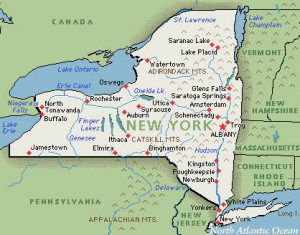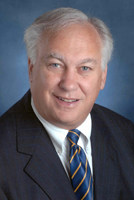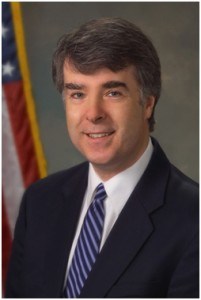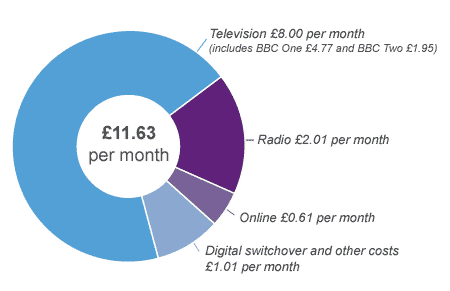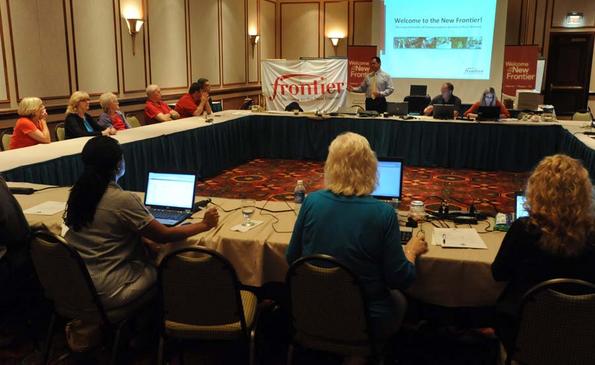
Frontier Communications rented a conference room at the Charleston Embassy Suites, calling it a "command center" for the transition. (Courtesy: Charleston Gazette/Lawrence Pierce)
No state faces a larger impact from Verizon’s exit than West Virginia. The epitome of the kind of market Verizon doesn’t want to serve any longer, West Virginia suffered through several years of Verizon not keeping up with required investments in the aging landline network, and service had markedly deteriorated as a result. West Virginia is mountainous — expensive to maintain infrastructure, often rural — reducing potential revenues, and economically-challenged — killing the chances of making “triple-play” sales (and profits) in communities where customers have to watch every penny.
West Virginia was also the epicenter of the loudest controversy over the sale, as unions and consumer groups opposed the transaction because of its enormous threat to an entire state’s landline network. A failure by Frontier would result in the kind of drama experienced by northern New England customers of FairPoint Communications, who suffered with more than a year of horrible service and inaccurate billing.
So news that Frontier has run into problems in the state just one week in, despite sending 250 extra employees into the area for the conversion, has raised concerns with the Public Service Commission, as well as those impacted by problems and outages. Frontier has tried to put its best face forward, with employees holed up in a self-described “command center” in a conference room at the local Embassy Suites in Charleston. On the day before the handover, press photographers were able to snap pictures of Frontier employees seated at long conference tables facing one another, with laptops open. A digital projector showed PowerPoint slides that promoted the “new Frontier” while a temporary company banner tacked to a corner wall rippled over a stand. A high tech glitz and glamor presentation this was not.
David Armentrout, president and chief operating officer of FiberNet was underwhelmed by all of it. His company requires connections with West Virginia’s landline provider to deliver full service to his clients. Prior to the handover, Armentrout said FiberNet had 43 outstanding trouble tickets on file with Verizon. But Verizon apparently never handed over those support tickets to Frontier, effectively losing them after the transition. Now that Frontier has taken over, Armentrout’s company has had to open 113 trouble tickets for problems old and new.
Armentrout complained about the lack of results from Frontier in the pages of the Charleston Daily Mail:
Armentrout said that after consistently being put on hold for more than an hour when trying to reach Frontier to talk about outstanding trouble tickets, “we had a meeting with their senior team on Saturday. We said this was not acceptable. Since then they’ve given us a work-around with two dedicated Frontier employees. When we get an hour hold time, we contact these dedicated employees.
“Another issue we’ve had is, we’ve had to contact our customers directly to verify the status of their trouble tickets because the (Frontier) system doesn’t tell us the status,” he said. “As a result of having to contact our customers directly and working with Frontier on all of these issues since July 1, our dedicated team has spent over 200 man-hours working on these issues.
“When you look at the results: six of 43 completed and three of 113 completed, we’re doing a lot of work and spending a lot of man hours but not really seeing a lot of service issues being resolved.
“Unfortunately on Friday the Public Service Commission was closed,” Armentrout said. “We made attempts to get in touch with them because we recognized we would have the problems we’re continuing to have today. I want our customers to know we’re doing everything we can to get these issues resolved.
“Several individuals within Frontier have exhibited good-faith efforts to resolve these issues,” he said. “We commend them for their efforts. But what we’re looking for is results. We need to get these issues fixed. They’ve made efforts but at the end of the day we’re still not getting where we need to be.
“Come Tuesday when business gets back to normal we can expect these numbers to increase unless we get these issues resolved,” Armentrout said. “Our intention is to go to the Public Service Commission on Tuesday and get them involved to make sure these issues are getting resolved as quickly as possible. It has been a long weekend.”
Ken Arndt, president of Frontier’s Southeast Region, issued a statement Sunday that unconvincingly blamed some of the delayed fixes on the recent death of West Virginia Senator Robert Byrd:
“We are doing the necessary work needed to correct old and current issues. It’s Day 4 and overall this has been a very successful conversion. That is especially true when you remember that Day 2 was marked by the presence of the President and Vice President of the United States and many members of Congress at the memorial for Sen. Robert Byrd. We made sure Frontier’s system performed flawlessly.”
The newspaper notes Verizon’s landline network in the state is notorious for having problems when there are storms, and since the July 1st transition there have not been any. Armentrout agrees, hoping that Frontier’s outstanding issues get resolved before the first major storm hits the state, which could come as early as Friday. Armentrout calls the first severe weather challenge Frontier faces “the mid-term exam.”
 Taking the longer view, Frontier promises it will spend millions in West Virginia to update the state’s landline infrastructure and expand broadband availability. Frontier announced the hiring of nine regional managers to oversee operations across the state, including Mitch Carmichael, a delegate in the West Virginian legislature representing Jackson. Carmichael is a former computer salesman who will now manage Frontier’s Parkersburg office.
Taking the longer view, Frontier promises it will spend millions in West Virginia to update the state’s landline infrastructure and expand broadband availability. Frontier announced the hiring of nine regional managers to oversee operations across the state, including Mitch Carmichael, a delegate in the West Virginian legislature representing Jackson. Carmichael is a former computer salesman who will now manage Frontier’s Parkersburg office.
Customers are less impressed. Many have experienced lengthy outages with their DSL service since the transition — a bad omen for many Charleston residents who immediately called Suddenlink, the area’s cable company, to switch service providers. Another Charleston customer called Frontier’s continued reliance on a Yahoo!-provided “front end” “really low class.” In nearby Huntington, a few customers couldn’t say much about what changed after Frontier took over because their phone service went out on the 1st and was still out a week later.
“I hope they don’t raise the bill since we have not had any phone service at all since 11:00am on July 1st when Frontier took over,” wrote one customer. “With my phone service out since Saturday and a new promise of repairs to be made by Tuesday July 6th, I am waiting to see where Frontier improves service in rural West Virginia. The Verizon employees would just as soon as to tell you anything — same people, just a different company. Frontier needs to have a major house cleaning, as their tales haven’t changed along with the service,” writes another.
A handful also complained that their Frontier phone service cost plenty more than what Verizon charged:
“My parents have Frontier and their bill is twice as high as my Verizon. We have the DSL and the freedom package (unlimited long distance, call waiting, voicemail and caller ID) and my bill is $78 a month. My parents only have local calling, call waiting, voicemail, caller ID, and DSL and their bill is over $120 with no long distance,” he writes. “How is this take over going to help anyone other than Frontier? I’m going to cable for Internet and phone.”
[flv]http://www.phillipdampier.com/video/WSAZ Charleston Frontier Carriers Experience Minor Problems 7-6-10.flv[/flv]
WSAZ-TV in Charleston says some companies are experiencing minor problems in the West Virginian conversion from Verizon to Frontier. (2 minutes)


 Subscribe
Subscribe




